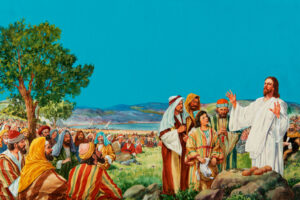Daily Lesson for Thursday 1st of August 2024
Read Mark 6:34-52. What was the problem Jesus and His disciples confronted, and how was it solved?
After the disciples return from their mission, they go with Jesus to a remote area on the eastern shore of the Sea of Galilee to rest. But a large crowd of 5,000 people arrives at the location before them. Jesus sees that they are like sheep without a shepherd. He teaches them the entire day.
In the evening the disciples recommend sending the crowd away to find food, but Jesus tells them to feed the crowd. The ensuing dialogue (Mark 6:35-38) illustrates that the disciples are thinking in human terms about how to solve the problem. However, Jesus resolves the problem by miraculously feeding the large crowd with just five loaves and two fish.
Characteristics of this story play into the popular concept of Messiah in Jesus’ day. The expectation was that the Messiah would liberate Israel from her enemies and would bring in righteousness and peace. A large number of men in a desert setting would carry with it military overtones of revolt (compare with John 6:14-15; Acts 21:38).
This notion is strengthened by the reference to Jesus’ seeing the people like “sheep without a shepherd,” a partial quotation from Numbers 27:17, where Moses asks God to appoint a leader for Israel after him. This phraseology about a shepherd for God’s people appears elsewhere in the Old Testament, typically with reference to Israel’s lack of a leader or king (compare with 1 Kings 22:17; 2 Chronicles 18:16; Ezekiel 34:5-6).
Yet, Jesus does not meet their false expectations. Instead, He sends His disciples away and dismisses the crowd. And, rather than lead a rebellion against Rome, what does He do? He retreats to a mountain to pray—not what the people were expecting.
In place of the popular view of the Messiah as a king who liberates Israel, He comes to liberate people from the bondage of sin. His walking on the water displays to the disciples that He is, indeed, the Lord of nature. But He does not come to rule but to give His life as a ransom for many (Mark 10:45).
|
What should this story tell us about why a correct understanding of prophecy is important? If a false understanding of Christ’s first coming led to disaster for some, how much more so could a false understanding do the same for some in regard to His second? |
 (0)
(0)Source: https://ssnet.org/blog/24c-05-a-different-kind-of-messiah/




